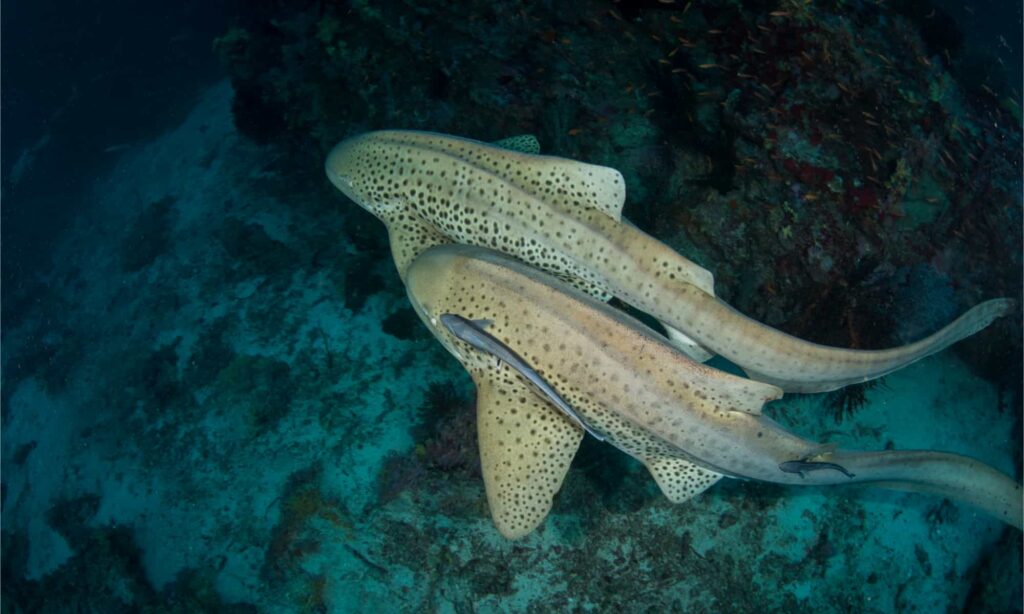Do Leopard Sharks Attack Humans? Sharks, in general, have a reputation for being dangerous predators. Their portrayal in movies and media often contributes to a fear of sharks, regardless of the species.
But what about leopard sharks? These sharks, despite their menacing name and appearance, are far from the aggressive predators people often imagine. So, do leopard sharks attack humans?
In this detailed guide, we’ll explore the behavior, diet, and habitat of leopard sharks, along with providing insights into why these fascinating creatures are considered safe.
We will also address common concerns and misconceptions surrounding shark attacks. Let’s dive deeper into the world of the leopard shark and dispel some myths while answering the burning question: Do leopard sharks attack humans?
What is a Leopard Shark?
Leopard sharks, scientifically known as Triakis semifasciata, are a species of sharks found primarily along the Pacific Coast of North America.
They are easily recognizable by their unique, leopard-like pattern of dark spots and bands across their grayish body. [Do Leopard Sharks Attack Humans?]
They thrive in shallow coastal waters, where they feed on a variety of prey. Despite being called “sharks,” leopard sharks have a mild temperament, making them non-threatening to humans.
Physical Description
Leopard sharks are relatively small compared to other sharks, growing up to 5-6 feet (1.5-1.8 meters) in length. They have a streamlined body built for quick movement through the water.
The most distinct feature of the leopard shark is its pattern of dark saddle-shaped spots that resemble a leopard’s fur, which provides them excellent camouflage when swimming in the kelp forests and estuaries they call home.
Their blunt teeth are ideal for grinding up small prey rather than tearing flesh.
Leopard sharks belong to the family Triakidae, which is often referred to as the hound sharks. This family includes species that are generally non-aggressive and peaceful.
Unlike other sharks, their teeth are not designed for large, predatory bites but are more suited to suction feeding, where they sift through the sand and mud to find food.

Do Leopard Sharks Attack Humans?
It’s important to address the concern of shark attacks specifically, leopard sharks and dispel some of the common misconceptions. Shark attacks on humans, while tragic and dramatic when they do occur, are extremely rare.
And with leopard sharks, they are even less likely to happen. These sharks are among the least dangerous species of sharks and are more interested in their natural diet of smaller prey.
Aggression Level
Leopard sharks are known for their mild temperament and are far less aggressive than other types of sharks.
Their natural behavior is to avoid conflict, and they have a non-territorial nature, meaning they do not defend a specific area or chase off other creatures.
When humans enter their habitat, they may approach to investigate but rarely display any signs of aggression.
Sharks, in general, are often mischaracterized as aggressive, but this is not the case for leopard sharks. They do not engage in predatory behavior toward humans.
Rather than being a threat, they are often seen as shy, curious creatures that avoid confrontation at all costs.
Recorded Incidents of Leopard Shark Attacks
To date, there have been no confirmed reports of leopard sharks attacking humans. There are, however, occasional incidents where a shark might bite or nudge a human, but these are rare and typically result from the shark’s curiosity rather than malice.
Such interactions are usually not serious, with any bites being more of a “misunderstanding” than an intentional attack. [Do Leopard Sharks Attack Humans?]
It’s also worth noting that some attacks involving sharks may not necessarily be from leopard sharks but rather from species known for being more aggressive, such as great white sharks or bull sharks.
In fact, when looking at data on shark attacks globally, leopard sharks are virtually absent from the list of species involved in harmful incidents.
Reasons for Low Aggression in Leopard Sharks
Several factors contribute to the low aggression of leopard sharks, and these factors help explain why they are considered one of the safest sharks to encounter:
- Dietary Preferences: Leopard sharks primarily feed on smaller marine life such as small fish, crabs, and shrimp. They do not see humans as prey, and their blunt teeth are designed for crushing shells and grinding small organisms, not for tearing into large animals.
- Non-Territorial Behavior: Unlike some other shark species, leopard sharks do not defend territory aggressively. Instead, they swim in large areas and show little interest in fighting over resources.
- Social Behavior: Leopard sharks are often seen swimming in groups, indicating that they are not solitary or territorial creatures. Their social nature makes them more peaceful and less likely to engage in aggressive behavior.
- Shy Nature: Leopard sharks are generally shy and will swim away from humans if they feel threatened. They are not prone to approaching swimmers or divers in a manner that would indicate aggression.

Why Leopard Sharks Are Considered Safe
The image of a menacing shark chasing after humans is something deeply embedded in popular culture. However, when it comes to leopard sharks, nothing could be further from the truth. Here’s why these sharks are widely regarded as safe:
Shark and Human Interaction
While shark-human interactions are often associated with fear and danger, interactions with leopard sharks have been described as peaceful and non-threatening. [Do Leopard Sharks Attack Humans?]
In fact, divers, swimmers, and snorkelers often seek out leopard sharks for underwater photography because of their calm behavior and their willingness to let humans observe them up close.
Leopard sharks, as previously mentioned, tend to avoid human contact.
They may swim in the vicinity of humans out of curiosity, but they are not inclined to bite or engage in aggressive behavior. Most encounters end with the shark swimming away once it has satisfied its curiosity.
Behavioral Traits of Leopard Sharks
Leopard sharks display a gentle nature and are generally considered to have a mild temperament. In their natural habitat, they swim in shallow waters near the coastline, often in groups.
This social behavior reduces the likelihood of confrontational interactions, as they are not typically defending a territory or actively seeking to establish dominance.
Unlike other shark species, leopard sharks rarely display any signs of aggression. They do not attack humans or large animals in their environment.
Their feeding habits also do not involve hunting large prey, further contributing to their reputation as non-aggressive animals.
Misconceptions About Shark Attacks
There is a common misconception that all sharks are dangerous, and any encounter with them could lead to an attack.
However, as we’ve seen with leopard sharks, this is simply not true. Most sharks, including leopard sharks, are not interested in humans as prey, and their behavior toward us is largely one of curiosity rather than aggression.
The fear of shark attacks is largely driven by media sensationalism and a misunderstanding of shark behavior.

Safety Tips for Swimming Near Leopard Sharks
Even though leopard sharks are generally safe to swim with, it’s always a good idea to follow safety precautions when interacting with any wild animal. Here are some tips for swimming safely around leopard sharks:
Stay Calm and Avoid Sudden Movements
Sharks are sensitive to sudden movements and disturbances in the water. By remaining calm and swimming slowly, you reduce the risk of startling the shark.
Sudden or erratic movements may confuse the shark and make it feel threatened, though leopard sharks are less likely to react aggressively than other shark species.
Keep a Respectful Distance
While leopard sharks are not aggressive, it’s essential to maintain a respectful distance. This gives the shark space to feel comfortable and continue its natural behavior.
Approaching the shark too closely may cause it to swim away or become startled, even if it is not aggressive. [Do Leopard Sharks Attack Humans?]
Avoid Provocation
Never try to touch or interact with the shark directly. While leopard sharks may not be dangerous, touching or grabbing them can cause stress or confusion for the animal. Respectful observation is the key to a safe and peaceful interaction.
Swim in Groups
If you’re in an area known for sharks, including leopard sharks, it’s always better to swim in groups rather than alone. Sharks are less likely to approach a group of humans and will often swim away from larger numbers of people.
Final Verdict
To summarize, leopard sharks do not attack humans. Their low aggression and curious nature make them among the safest sharks to encounter in the wild.
While some may fear sharks in general, leopard sharks are peaceful creatures that are more interested in their natural habitat than in engaging with humans.
If you happen to encounter one while swimming or diving, you’ll likely experience a calm and gentle interaction. [Do Leopard Sharks Attack Humans?]
FAQs
Are leopard sharks aggressive?
No, leopard sharks are not aggressive. They have a mild temperament and usually avoid human contact. They are non-territorial and curious rather than hostile.
Which shark attacks humans the most?
The great white shark is responsible for the most attacks on humans. It’s a more aggressive species compared to others. However, attacks are still rare and often involve mistaken identity.
Can you swim with leopard sharks?
Yes, you can swim with leopard sharks. They are gentle and non-aggressive, making them safe to observe in the wild. Just remember to keep a respectful distance.
Can you touch a leopard shark?
While it’s possible to touch a leopard shark, it’s best not to. It can stress the shark and disturb its natural behavior. Always maintain a respectful distance.
What shark is the friendliest?
The whale shark is considered the friendliest of all sharks. It is a gentle giant, often seen swimming calmly near humans. Despite its size, it poses no threat.
How friendly are leopard sharks?
Leopard sharks are known for their mild temperament. They are not aggressive and are often curious about humans but avoid confrontation. They are generally peaceful.
What shark has the most aggressive?
The bull shark is considered one of the most aggressive sharks. It is more likely to attack due to its territorial nature and tendency to swim in shallow waters.
Who eats leopard sharks?
Adult leopard sharks have few natural predators, but young sharks may fall prey to larger predators like killer whales or larger species of sharks. They are not commonly eaten by other animals.
Conclusion: Do Leopard Sharks Attack Humans?
Leopard sharks are among the safest sharks to encounter in the wild. Their curious behavior and gentle nature make them a fascinating species to observe, but they pose no real threat to humans. Their mild temperament, non-territorial behavior, and focus on small prey make them one of the least aggressive sharks.
So, the next time you hear someone ask, “Do leopard sharks attack humans?” you can confidently answer, “No, they do not.”
With proper safety precautions and a respectful attitude, humans and leopard sharks can coexist peacefully, offering an opportunity to appreciate these beautiful creatures in their natural habitat.
By understanding the truth about leopard sharks and their behavior, we can help debunk the myths surrounding sharks and work towards a better understanding of the marine life that shares our oceans. [Do Leopard Sharks Attack Humans?]
Read more knowledgeable blogs on Magnochi









